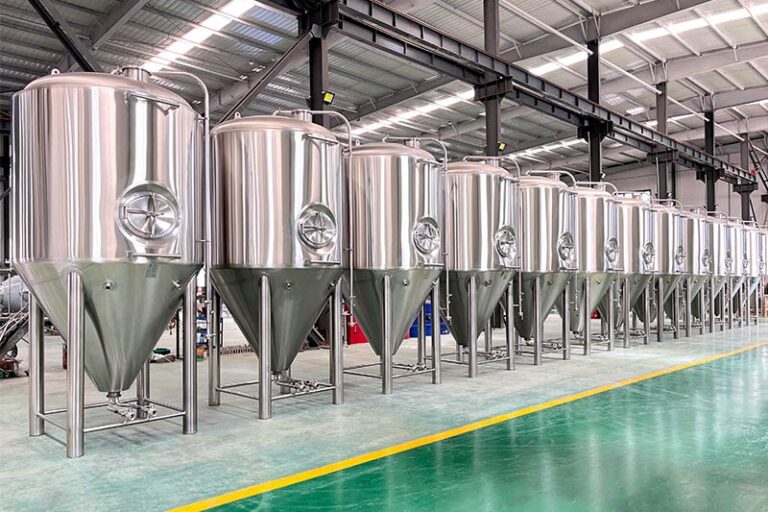A commercial beer fermentation tank is an indispensable key equipment in modern beer brewing facilities. It is responsible for the fermentation process of beer in a controlled environment. The fermentation tank not only provides a stable fermentation environment but also plays a decisive role in the flavor, alcohol concentration, and carbonation of beer. This article will introduce what a commercial beer fermentation tank is and what its types are. Brewers can learn more about commercial beer fermentation tanks through these to meet the needs of commercial production.

What are commercial beer fermenters?
Commercial beer fermenters are temperature-controlled vessels that provide optimal conditions for beer fermentation. During the fermentation process, microorganisms such as yeast or bacteria convert sugars into alcohol, carbon dioxide, and other compounds that give beverages their unique flavor, aroma, color, and texture.
Commercial fermenters enable large-scale beverage production and range in capacity from a few barrels to thousands of barrels. They are made of stainless steel or other approved materials to resist corrosion from acidic products. Fermenters can be customized with accessories such as temperature controllers, cooling jackets, valves, sampling ports, and CIP (cleaning in place) spray balls.
Key Functions of Commercial Beer Fermenters
Temperature Control
Gas Management
Types of commercial beer fermentation tanks
- Vertical fermentation tank: The tank is placed vertically, with a narrow bottom and a wide top. It is usually made of stainless steel to ensure corrosion resistance and easy cleaning. The design is simple, suitable for most traditional fermentation needs, and relatively space-saving. The operation and maintenance are relatively simple, and it is easy to clean and inspect.
- Horizontal fermentation tank: The tank is placed horizontally, with a large bottom area. It requires a larger fermentation space, is suitable for long-term fermentation, and is more suitable for large-scale brewing.
- Pressure fermentation tank: The fermentation tank can withstand internal pressure and is designed with a stronger tank body. It is suitable for beer that needs to maintain a carbonized state and is often used for storage and secondary fermentation. It can effectively maintain the carbonization of beer and prevent gas from escaping. It is suitable for a variety of beer types, especially beer that requires high carbonization.
- Fermentation and storage integrated tank: The fermentation and storage functions are integrated into one tank, and the design is multifunctional. The fermentation, maturation, and storage processes are completed in one tank, saving space and time. It simplifies the production process and reduces the risk of loss and contamination during transfer.
Materials for Commercial Beer Fermentation Tanks
- Stainless steel: Stainless steel is the material of choice for many commercial breweries and professional homebrewers due to its durability, resistance to scratches and stains, and excellent temperature control. The smooth surface allows for easy cleaning and disinfection, reducing the growth of bacteria and contaminants. However, stainless steel fermentation tanks tend to be more expensive than other options.
- Glass: Glass fermentation tanks allow for a clear view of the fermentation process and are less prone to scratching and staining. However, they are more fragile than other materials, can break easily if not handled with care, and are more expensive.
- Plastic: Plastic fermentation tanks are lightweight, affordable, and easy to clean. However, they are more susceptible to scratches, which can breed bacteria and lead to contamination. They are not suitable for high-temperature fermentation processes and may deform or release harmful substances. In addition, some plastic fermentation tanks may not be as sealed as other fermentation tanks, making them less suitable for long-term storage or aging.
- Ceramic products: Ceramic fermentation tanks have excellent insulation and temperature control properties, making them ideal for fermenting lagers and other cold-fermented beers. They are heavy and harder to clean than other materials. They are more expensive to clean and more difficult to construct and maintain.
- Aluminum Alloy: Aluminum Alloy Fermentation Tanks Aluminum alloy is lighter than stainless steel, making it easier to install and maintain. Better thermal conductivity helps adjust the fermentation temperature more quickly. Aluminum alloys have poor corrosion resistance to acidic substances and may require additional coating or protection. Aluminum alloys are less durable than stainless steel and may require more frequent maintenance and replacement.

How to choose a commercial beer fermenter?
Capacity size
Temperature control system
Cleaning and maintenance
Budget cost
Supplier selection

FAQ
What is a commercial fermenter?
What are the main functions of commercial fermenters?
What is the price range of commercial fermenters?
The price range of fermenters varies depending on their capacity, material, additional features (such as temperature control, and cleaning system), and brand. Small fermenters may cost from a few hundred to a few thousand dollars, while large fermenters may cost tens of thousands of dollars.
How to ensure the quality of fermenters?
- Choose a reputable supplier: Choose a supplier with a good reputation and experience.
- Check certifications and standards: Confirm that the equipment meets industry standards and certifications (such as CE, and ISO).
- Request a site visit: If possible, visit the production plant to see the manufacturing and inspection process of the equipment.

